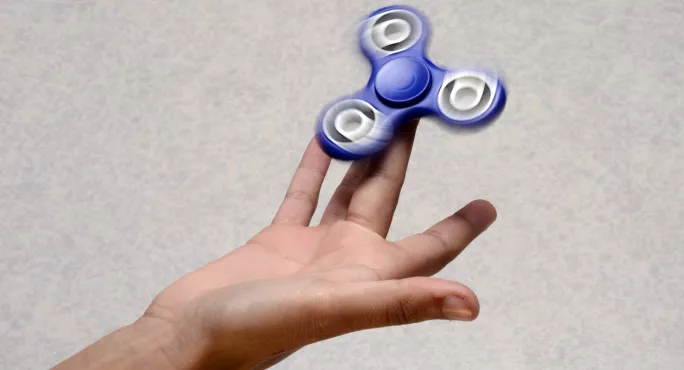- Home
- ‘We need a more nuanced, informed approach to fads like fidget spinners’
‘We need a more nuanced, informed approach to fads like fidget spinners’

Kids love trends. Walk around any playground and this becomes immediately apparent. Whether they are trading quotes from the latest hit TV show or showing off whatever the latest must-have toy or gadget is, every generation of children has experienced some fad that dominated their lives, however briefly.
Personally, I was a child of sticker albums. I loved gradually filling up the bright and colourful books dedicated to my current favourite movie, TV show or video game, and many a lunchtime was spent seeking out other kids’ stickers and swapping our spares. Few things in my childhood, if I’m being entirely honest, were more exciting than when I finally obtained a sticker of Jürgen Klinsmann for a Premier League sticker album (back when I still actually cared about football).
Now, anyone who has wandered a playground in the past few months or read Tes knows that the latest craze sweeping through schools is fidget spinners. Criticism of fidget spinners has been extensive and, in some cases, vitriolic.
I am more conflicted about them, not least because they are supposedly designed to assist people who, like me, are on the autistic spectrum.
An informed perspective?
From a purely teaching perspective, to argue that the spinners are completely without merit is, I feel, inaccurate. If handed two fidget spinners, most adults would be hard-pressed to tell the differences between them. Children do know, however, and I have observed them engaging in in-depth discussions about the materials used in their construction, how removing the bearings affects their balance and even the sounds they make while they spin.
There is an engagement in learning that may not be directed as teachers wish, but that could be harnessed. Not directly, though: they might have some application in classrooms investigating how different factors affect them in science lessons, but even then their application seems limited - and, besides, children have been doing that on their own for weeks now.
Emotionally, we clearly need to better understand what drives the fad. Children are determined to have their own fidget spinners and keep up with their friends, despite it appearing so trivial to us grown-ups. It’s like getting a new pair of trainers; we might not care about brands, but children do, and if they can’t participate in whatever’s “hot” right now they get ostracised, even bullied. But perhaps we have a duty to take that temptation to exclude on the basis of a toy out of the children’s hand, by banning them.
Where I am most conflicted about fidget spinners is how they came to be. According to most reports, they were originally developed as a coping tool for children with ADHD, anxiety disorders and even autistic spectrum disorders. As someone on the autistic spectrum myself, I must admit I’m dubious about the idea of fidget spinners helping in any way in my day-to-day life.
Then again, everyone responds differently to different stimuli and I have friends on the spectrum who swear by the things. Doubtless there are plenty of autistic children for whom Fidget Spinners are a valuable item for coping with the everyday world.
A twisted narrative
And because of that, something about the craze of fidget spinners strikes me as perverse; I dislike the idea of something that could be useful to a child’s mental wellbeing being an utterly disposable fad for the “neurotypical” masses, and it makes me worry that there is nothing big businesses won’t exploit and ruin for the sake of short-term profit.
Also, as with anything that becomes insanely popular, a backlash is already forming against fidget spinners, and I fear that this will lead to children who do legitimately use them to cope being ostracised and alienated. They will have to find a new coping tool that will undoubtedly be accosted by near-sighted businesses.
I think it is easy for teachers to dismiss fads like fidget spinners, and there is much truth in many of those criticisms. But we need to avoid a gut reaction and look on these trends with a more understanding eye, do our research as we would with anything else and be mindful of the nuance in every situation.
Often, these fads are more important to children than we realise, more helpful than we might recognise and have some truth in them we can’t easily see.
Andrew Middlemas is a teaching assistant at West Cliff Primary School in Whitby, North Yorkshire
Want to keep up with the latest education news and opinion? Follow Tes on Twitter and like Tes on Facebook.
Register with Tes and you can read two free articles every month plus you'll have access to our range of award-winning newsletters.
Keep reading with our special offer!
You’ve reached your limit of free articles this month.
- Unlimited access to all Tes magazine content
- Save your favourite articles and gift them to your colleagues
- Exclusive subscriber-only stories
- Over 200,000 archived articles
- Unlimited access to all Tes magazine content
- Save your favourite articles and gift them to your colleagues
- Exclusive subscriber-only stories
- Over 200,000 archived articles